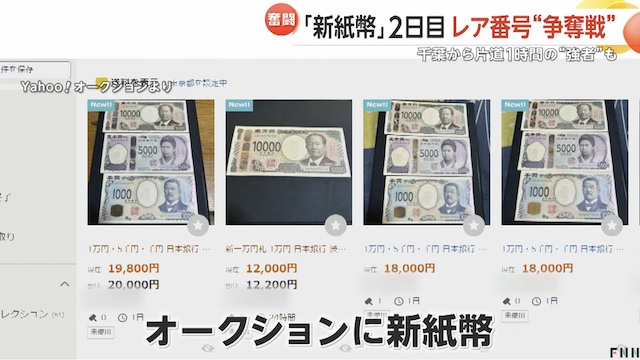TOKYO, Jul 05 (News On Japan) - Japan's new banknotes, which began widespread circulation on July 4th, have sparked a frenzy among collectors and the general public alike. At the Mitsubishi UFJ Bank's main branch in Marunouchi, Tokyo, many people lined up to exchange their old bills for the new ones on the second day of issuance.

One man, who had traveled an hour from neighboring Chiba Prefecture, expressed his excitement: 'I wanted to show off to my friends. In a few years, these will become ordinary, but for now, I just want to brag about having them.'
Another customer showed off his new banknotes, pointing out that the serial numbers started with 'AA'. This indicates they are from the first production lot, making them especially desirable among collectors. Many have taken to social media to share their joy at obtaining these rare notes.
One collector mentioned, 'I collect various commemorative coins and notes for my children's future. I hope to present them with these rare items when they grow up.'
But what value do these serial numbers hold? At a coin shop, we asked about the worth of old bills. The shop owner, Minoru Terada of Shimbashi Stamp Trading Co., showed us a 1000 yen bill with the serial number 'XC77777C', explaining that its value was 28 times the face value, priced at 28,000 yen.
Terada then revealed their most prized note: 'ZZ555555Z', valued at an astounding 500,000 yen.
While the 'AA' serial numbers on new banknotes are not expected to fetch such high premiums, they have already appeared on auction sites. One site listed a 5000 yen note with an 'AA' serial number for 5900 yen, a 900 yen increase over its face value. Even notes with 'AC' serial numbers were being sold for significant markups.
However, LINE Yahoo, which operates Yahoo! Auctions, commented, 'In principle, cash is prohibited from being listed unless it is recognized as having collectible or rare value. We will delete such listings in accordance with our guidelines.'
There have also been reports of scams related to the new banknotes. In June, a woman in her 70s in Chiba Prefecture was deceived by a man claiming to be a postal worker. He told her, 'Keeping old banknotes could lead to crime. We will exchange them for new ones.' She ended up losing about 2 million yen in cash.
Police are urging caution, warning of the potential spread of 'old banknote exchange scams.'
Source: FNN















